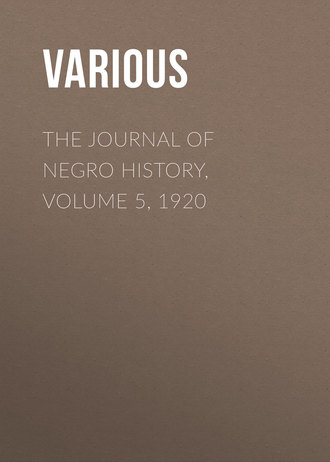 полная версия
полная версияThe Journal of Negro History, Volume 5, 1920
Sect. 2. Any Indian or person of color, belonging to either of the tribes before mentioned, and residing within the limits of any town or city of this Commonwealth, to whom the right of citizenship is not extended by the first section of this act but who wishes to exercise that privilege, may certify the same in writing to the clerk of the town or city where he resides, who shall make record of the same: and upon paying a poll tax, he shall become, to all intents and purposes, a citizen of the State, and shall not, thenceforward, return to the legal condition of an Indian. And settlement shall be required, by those who become citizens, under the provisions of this act, in the same manner they are acquired by other persons, under the General Statutes of the Commonwealth.
Sect. 3. It shall be the duty of the governor, by and with the advice and consent of the council, to appoint an able, discreet, and suitable person, to be Indian commissioner, who shall hold his office for the term of three years, unless sooner removed by the governor and council. And the governor and council shall fill all vacancies which shall happen in said office, by death, resignation, expiration of said term, or otherwise. It shall be the duty of said commissioner to exercise a careful supervision over the affairs of all the Indians of the Commonwealth, not endowed by the provisions of this act, with the rights of citizenship, and to aid them, by advice, counsel, and whatever other suitable means may be within his control, to promote their welfare, to improve their general condition, and to qualify themselves, judiciously, and with safety to themselves and others, to be placed, at as early a time as may be, on the same legal footing as the other inhabitants of the Commonwealth. He shall exercise all the powers, perform all the duties, and be subject to all the restrictions, responsibilities and liabilities, which now by law appertain to the treasurer of Marshpee, and to the guardians of other tribes except so far as they may be charged or varied by the provisions of this act; and he shall give bonds, to the satisfaction of the governor and council, for the faithful performance of such trust.
Sect. 4. The said commissioner shall, as soon as is convenient, after his appointment, cause a registration to be made, on the basis of the general registration of the State, of all the members of the several tribes, specifying the parentage and date of the birth of each, as near as can be ascertained, and the date of all marriages of parties now living, with all the particulars, that are now required of town clerks, by the laws of the State, and having completed the same, up to the time required by law for the last preceding return to be made, he shall, thenceforward make and keep a true registration of all the births, marriages, and deaths, in each of the said tribes, and shall annually make due return thereof, the whole to be done in the same manner as is required of town clerks, and under the same liabilities and conditions that are, by law, imposed upon them.
Sect. 5. The said commissioner shall, in concurrence with the proper officers of the Gay Head tribe, cause a survey of all the land held in severalty, by the members of said tribe, setting out the same to each, by betes and bounds, and, when the survey is complete, shall cause a record of the portion of each proprietor to be made in the registry of deeds, of the county of Dukes County, and thereupon, the legal title shall vest in the several proprietors thereof, their heirs, and assigns, forever: provided, however, that no land on the plantation shall ever be alienated from the tribe or be held or possessed by any person who is not a member thereof; and when ever the family of any proprietor becomes extinct, the real estate of said proprietor shall revert to said tribe and become the property thereof, in common. And whenever, hereafter, any common land shall be taken up to be occupied and possessed in severalty, by any member of the tribe, having the concurrence of the tribe therein, the same shall be surveyed, set forth, and recorded, under the supervision of said commissioner, as is above provided; and no title to any common land, to be held in severalty, on said plantation shall be acquired in any other manner.
Sect. 6. The said commission shall cause a survey to be made of the Indian plantation at Fall River and the bounds thereof to be renewed, agreeably to the surveys made by order of the State in one thousand seven hundred and sixty-three. He shall ascertain to whom the several lots belong by hereditary descent from the proprietors to whom they belonged in one thousand seven hundred and sixty-four, so far as descendants of said proprietors still remain, and shall designate the same by the numbers of the lots respectively; and in the same manner, he shall designate the several lots, if such there be, of which the families of the former proprietors have become extinct, and shall make return of the same to the governor and council, for the use of the legislature, and shall report such other facts connected therewith as may be useful to them, and shall recommend such disposition of the land remaining in common, as in his judgment, shall be most conducive to the welfare of the Indians, and of the State.
Sect. 7. The said commissioner shall, as soon as the performance of the duties of his office shall have made him sufficiently acquainted with the necessities and wants of the Indians, and with the other facts necessary to qualify him for the service, prepare a bill embodying a system for governing, managing, and regulating the affairs of the several tribes, as nearly uniform in its provision respecting them severally, as the circumstances of the different tribes will permit, as a substitute for the present laws on that subject, and report the same to the governor and council for the consideration of the legislature, accompanied by the reasons on which the several provisions therein recommended are sustained.
Sect. 8. The Indians and people of color on Gay Head, and the officers by them appointed for the purpose, shall have the same powers in the management of their municipal affairs, and in relation to the employment of teachers, and the making and enforcing of all rules for the regulation and government of their schools, that by law are exercised by the inhabitants and corresponding officers of the several towns of the Commonwealth: provided, however, that this shall not be construed to authorize the alienation of any of the territory of the plantation: and provided, further, that no person shall be authorized to vote in municipal affairs, except natives of the Gay Head tribe, natives of other Indian tribes of this State married or having been married to a Gay Head woman and resident on the plantation, or such other person resident on the plantation and married or having been married to a Gay Head woman, as shall have the right conferred on him by a vote of two-thirds of the voters of the plantation.
Sect. 9. All acts and parts of acts heretofore passed, so far as they conflict with the provisions of this act, are hereby repealed.
Sect. 10. This act shall take effect from and after its passage.
If the legislature should decide not to authorize the appointment of a single commissioner for the State, I would propose the passage of the same Bill with the following amendments:—
Strike out the whole of section 3.
Strike out in section 4 the words "said commissioner shall, as soon as is convenient after his appointment," and insert the words—clerks of Marshpee, the guardians of the several plantation tribes, and the clerk of Gay Head shall.
In section 5, strike out the words "said commissioner," and insert the words—guardians of the Chappequiddick and Christiantown tribes. Also, in the latter portion of the same section, strike out the word "commissioner" and insert the word—guardian.
In section 6, strike out the words "said commissioner," and insert the words—guardian of the Troy or Fall River tribe.
Strike out section 7, entire.
Alter the numbering of the sections after 2, to correspond to the changes.
Insert the following section after section 8:—
Sect. —. No person shall be entitled to support by any tribe in the State, of whose parents, one only was an Indian, and whose residence was not on the plantation of the tribe at the time of his birth, unless the rights of himself or parents as members of the tribe, shall have been subsequently recognized by the tribe.
SOME NEGRO MEMBERS OF RECONSTRUCTION CONVENTIONS AND LEGISLATURES AND OF CONGRESS 158
No systematic effort has hitherto been made to save the records of the Negro during the Reconstruction period. American public opinion has been so prejudiced against the Negroes because of their elevation to prominence in southern politics that it has been considered sufficient to destroy their régime and forget it. As future historians will seek for facts beyond those compiled by biased investigators now writing monographs in this field, a few persons realizing the importance of preserving the records in which the actual facts are set forth, are now directing the attention of the country to this neglected aspect of our history. These lists of suggestive names of the men who figured conspicuously in this recent drama will be decidedly useful in the collection of facts adequate to the presentation of both sides of the question. These lists are far from being complete. This is but a step in the right direction and persons in possession of such facts are earnestly urged to coöperate in collecting them.
It has been extremely difficult to determine the race of the members of the various Reconstruction bodies. The lists of members as published in the Journals of the legislatures do not indicate the race. This has to be determined by contemporary information. The methods used by other persons and agencies in identifying the race have been various. The Negro members of the North Carolina General Assembly, for example, were indicated by the figure 37 in the State Manual listing all persons who had been in the Assembly. Where no such information could be obtained from printed matter, it has been necessary to rely upon information obtained from individuals who participated in the Reconstruction.
Negro Members of the Alabama Constitutional Convention, 1867159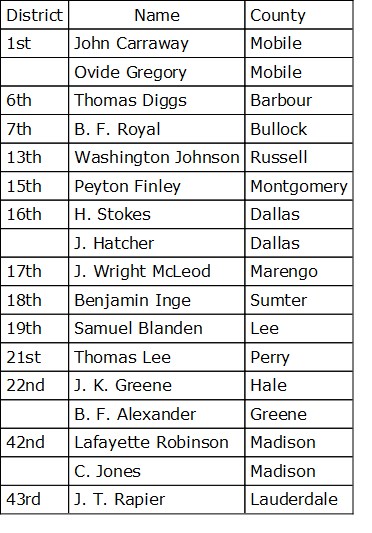
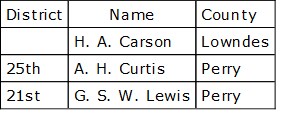
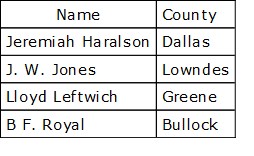
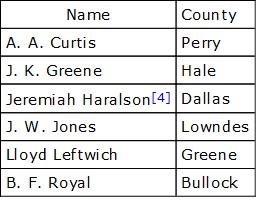
4 Beverly, History of Alabama, pp. 202-208.
HouseSession 1868 and 1869-1870
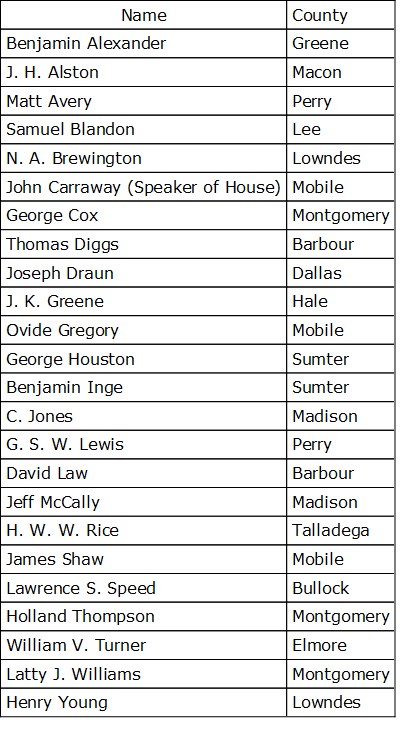
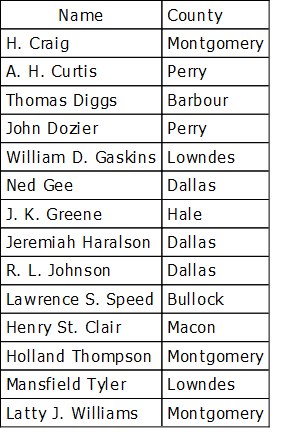
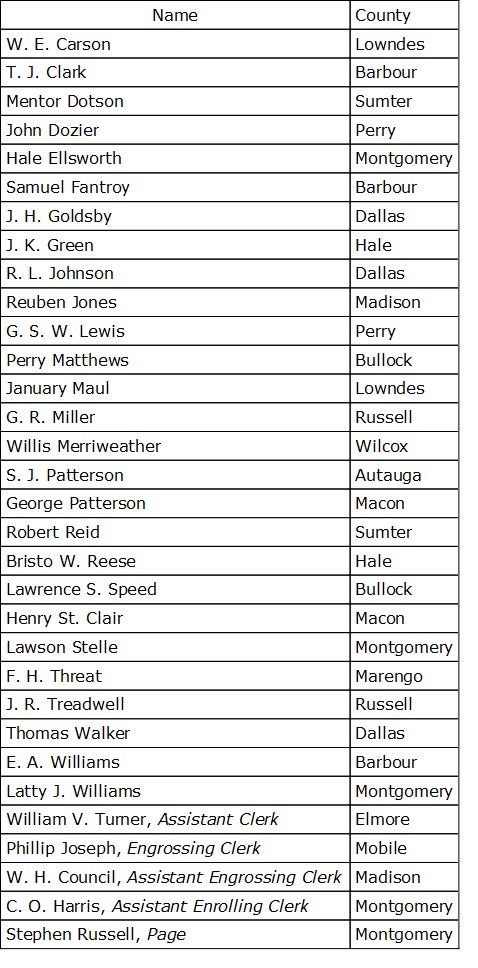
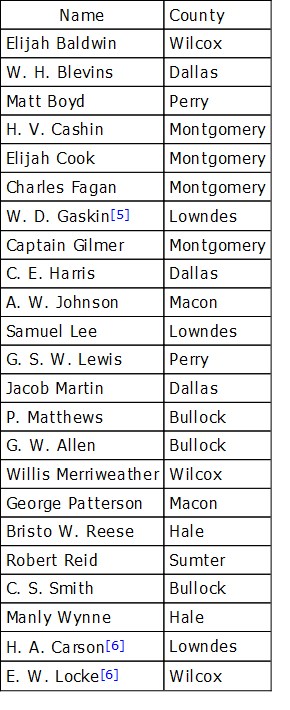
5 Served only in the session of 1874-1875.
6 Served only in the session of 1875-1876.
Negro Members of Congress From Alabama

James H. Alston was a member of the Alabama Legislature for Macon County, 1868 and 1869-79. He was a shoemaker by trade and had formerly been a slave. It was reported that before the war there was a Military Company in the town of Tuskegee. The members of this company desired to have a drummer, and for this purpose they sent to South Carolina and bought James H. Alston. It was thought that he came from Charleston.
Henry Young was a member of the Alabama Legislature about 1868 and 1869-70. He was a slave who could read and write, having been taught by his master's children. He would, somewhat like Frederick Douglass, spell out the words on letters that he was called upon to deliver or to get from the post office, and in this way he also increased his ability to read.
Conway, Ark.,—October 14, 1916.NEGROES IN POLITICS IN ARKANSAS DURING RECONSTRUCTIONIn the constitutional convention of 1868, there were 8 Negro delegates, that is, J. W. Mason, Richard Samuels, William Murphy, Monroe Hawkins, William Grey, James T. White, Henry Rector and Thomas P. Johnson. (Proceedings of the Constitutional Convention of 1868, pages 2 to 5.)
Negroes in the Arkansas Legislature: Session April 2 to July 23, 1869, and session November 17, 1868, to April 10, 1869, were seven Negro members of whom J. W. Mason, the leading Negro in the Senate; W. H. Grey, leading Negro in the House. (Daily Republican, Oct. 1, 1868).
In the Legislature of January 2 to March 25, 1871, there were eleven Negro members: J. W. Mason and J. T. White in the Senate: J. M. Alexander, Austin Barrow, Conway Barbour, John Webb, Adam Johnson, Jeff Haskins, A. Mays, William Young, Carl Pope, A. J. Robinson, E. A. Fulton in the House. (Daily Republican, March 25, 1871.)
In the 19th session, January 6 to April 25, 1873, the last session before Baxter called his special session, something less than one fifth of all the members were Negroes. I have been unable to ascertain the exact number in this session, but from the standpoint of numbers, I would judge that there is no great difference between this session and the previous one. The Arkansas Gazette of January 12, 1873, says of the Negro members: "There are a few men among these colored members who are bright and intelligent, and much superior to some white members, but as a rule, this is not the case."
(Signed) Thomas S. Staples,Hendrix CollegeConway, ArkansasNegro Members of the Florida Legislature during Reconstruction Period and AfterSenate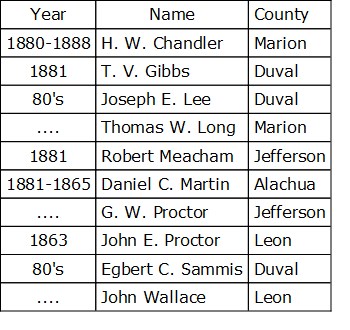
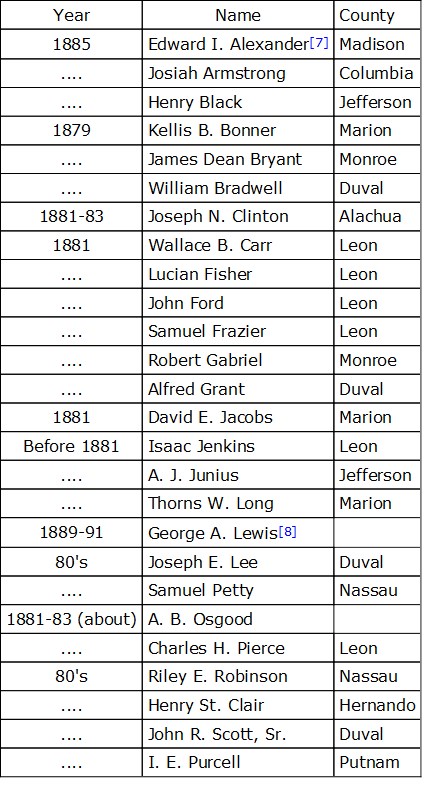
7 Alexander is said to have been counted out. He is said to have held the position of postmaster at Madison and also to have had a deputy reserve collector.
8 Lewis and Scott were the last Negro members of the Florida Legislature.
Representatives
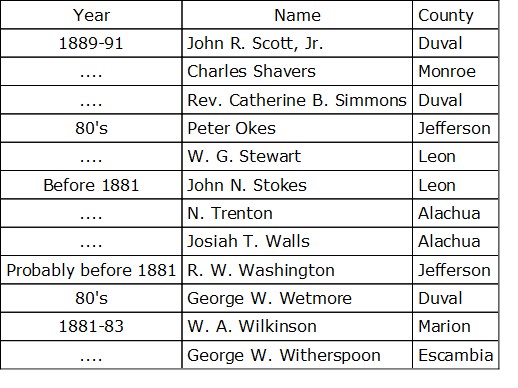
Joseph N. Clinton was born in Pittsburgh, Pennsylvania, November 4, 1854, and was reared in Philadelphia, Pennsylvania. He attended the Institute For Colored Youth and then entered Lincoln University, where he was graduated in 1873. He then taught school in South Carolina, Maryland and Florida. In addition to being a member of the Florida Legislature, 1881-83, he was clerk in the United States Land Office of Florida. He was Inspector of Customs at Pensacola, and for fourteen years held the position of Internal Revenue Collector at Tampa.
H. W. Chandler was Senator, Marion County, 1880-1888. For sketch of early life, see Simmons' Men of Mark. He was delegate to the National Republican Convention 1884-1908. He was Inspector of Customs at Tampa from May 1908 to December 1913.
George H. Mays was marshal of Jacksonville. This was an elective office. The position made him head of police force with appointive powers.
James Dean was County Judge, Monroe County in 1889, but served less than one year. He was impeached for issuing license to a colored Cuban man to marry a white Cuban woman. This a custom in Cuba. Dean was impeached on ground that he had issued license to Negro to marry a white woman. He was summarily removed without a hearing. This was said to have been a put-up job, as the man was secured to get a license. Dean did not have a trial. The only way to get case reviewed was to institute quo warranto proceedings. To do this, it was necessary to get the permission of the State's Attorney General to use the State's name. He was not able to do this.
Mitchell Chappelle was Negro Mayor of LaVilla. Formerly these were two adjoining towns, Jacksonville and LaVilla. The two are now Jacksonville.
Charles Dupont was reported as being sheriff of Monroe County about 27 years ago.
In 1887 Republicans went out of power in Florida. The Constitutional Convention put Negroes and Republicans out.
Negro Members of the Georgia Legislature, 1868-69Senate
10 Letter on October 11, 1916, from L. L. Knight, official compiler of Georgia Records; Thompson, Reconstruction in Georgia, pp. 211-214, 262, 264.
House
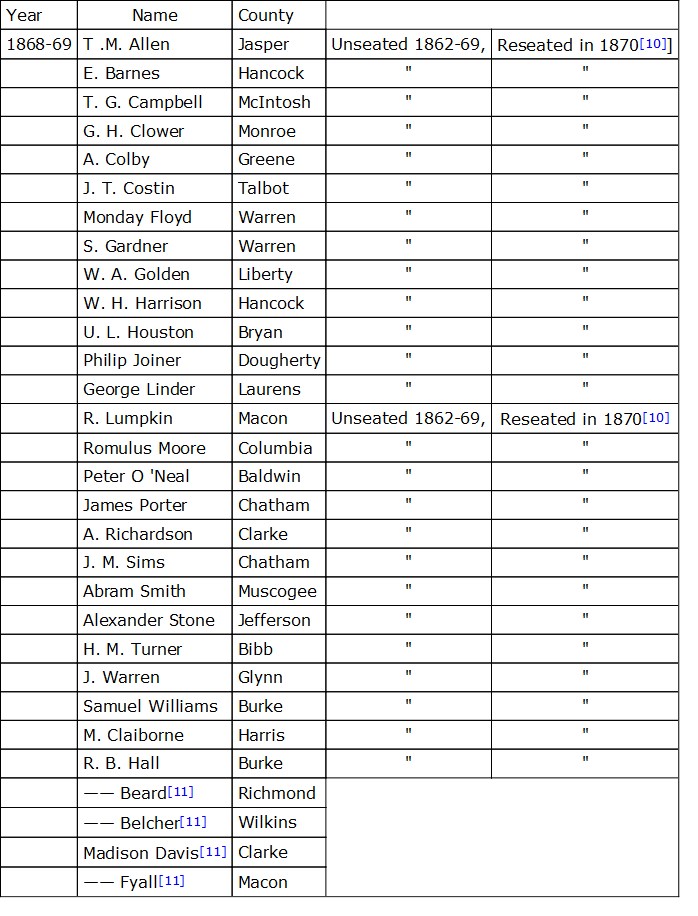
10 Letter on October 11, 1916, from L. L. Knight, official compiler of Georgia Records; Thompson, Reconstruction in Georgia, pp. 211-214, 262, 264.
11 The names of these four were later stricken out. They were so nearly white that their race was indeterminate. They remained in the house after the others were expelled.—Thompson, Reconstruction in Georgia, p. 213; House Journal Georgia Legislature, p. 229.
House
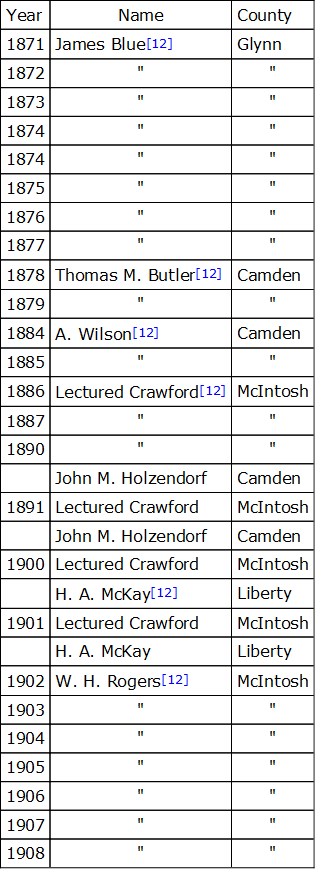
12 Letter on October 11, 1916, from L.L. Knight, official compiler of Georgia Records.
List of Negro Members in Mississippi Legislature—1870Senate
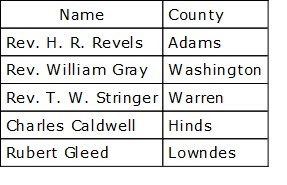

John R. Lynch elected speaker of the House.
H. R. Revels elected to United State Senate for the unexpired term.
—From J. M. Garner, Reconstruction in Mississippi, New York, 1901.Negroes Elected in 1871162
Josiah T. Settle was a member of the House from Panola in 1883-84.
G. W. Gayles was a member of the House 1873-77 and a member of the Senate 1877 to some time after 1886. He was the last Negro to be a member of the Mississippi Senate. For sketch of his career see Simmons' Men of Mark, 379-381.
Garner, Reconstruction in Mississippi, page 294, gives Negro members of the Mississippi Legislature for 1873 as Senate, 9; House, 55. On page 402, for 1876, Senate, 5; House, 16. Total membership, Senate, 37. Total membership, House, 116.
Negro Members of the North Carolina Reconstruction Constitutional Conventions, 1868 and 1875Dates of the Conventions January 14-March 17, 1868, and September 6-October 11, 1875. Total members of each Convention 120. Negro members, 13 in Convention of 1868, and 5 in Convention of 1875.
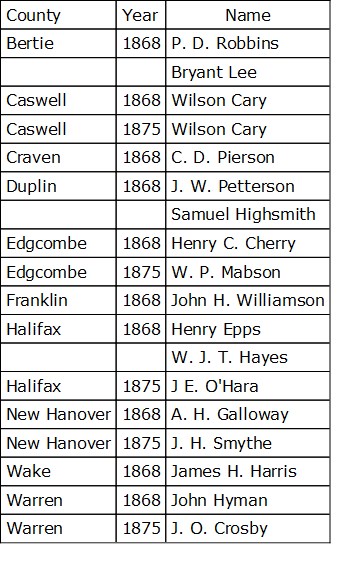

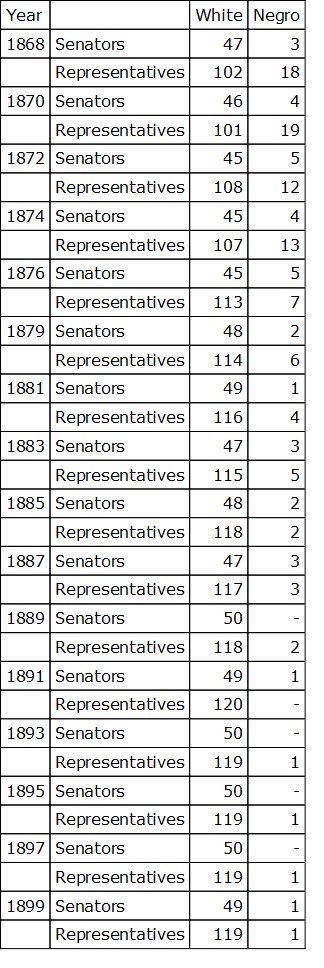
Abbeville—John A. Hunter, B. Milford, white; H. J. Lomax, W. N. Joiner, Thomas Williamson, colored.
Anderson—William Perry, N. J. Newall, white; Samuel Johnson, colored.
Berkeley—M. F. Becker, D. H. Chamberlain, Timothy Hurley, Joseph H. Jenks, A. C. Richmond, white; William Jervey, Benjamin Byas, W. H. W. Gray, George Lee, colored.
Beaufort—J. D. Bell, R. G. Holmes, white; F. E. Wilder, L. S. Langley, W. J. Whipper, Robert Smalls, J. J. Wright, colored.
Barnwell—C. P. Leslie, Niles G. Parker, white; James N. Hayne, A. Middleton, C. D. Hayne, Julius Mayer, colored.
Charleston—A. G. Mackey, C. C. Bowen, Gilbert Pillsbury, white; F. L. Cardozo, William McKinlay, R. H. Cain, R. C. DeLarge, A. J. Ransier, colored.
Chester—Purvis Alexander, Barney Burton, Sancho Sanders, colored.
Chesterfield—R. J. Donaldson, white; H. L. Shrewsbury, colored.
Clarendon—Elias E. Dickson, white; William Nelson, colored.
Colleton—J. S. Craig, white; William M. Thomas, William Driffle, W. M. Vinery, colored.
Darlington—B. F. Whittemore, white; Isaac Brockenton, Jordan Lang, Richard Humbird, colored.
Edgefield—Frank Arnim, white; R. B. Elliott, Prince R. Rivers, John Bonum, David Harris, John Wooley, colored.
Fairfield—James M. Rutland, white; H. D. Edwards, Henry Jacob, colored.
Georgetown—Henry W. Webb, white; F. F. Miller, Joseph H. Rainey, colored.
Greenville—James M. Allen, J. M. Runion, white; Wilson Cook, W. B. Johnson, colored.
Horry—Henry Jones, A. R. Thompson, colored.
Kershaw—J. K. Jillson, S. G. W. Dill, white; John A. Chestnut, colored.
Lancaster—Albert Clinton, Charles Jones, colored.
Lexington—Lemanuel Boozer, Simeon Corley, white.
Laurens—Joseph Crews, Y. J. P. Owens, white; Harry McDaniels, Nelson Davis, colored.
Marion—W. S. Collins, white; J. W. Johnson, H. E. Hayne, B. A. Thompson, colored.
Marlboro—Calvin Stubbs, George Jackson, colored.
Newberry—B. O. Duncan, white; James Henderson, Lee Nance, colored.
Orangeburg—E. W. M. Mackey, white; E. J. Cain, W. J. McKinlay, T. K. Sasportas, B. F. Randolph, colored.
Pickens—M. Mauldin, Alexander Bryce, L. B. Johnson, white.
Richland—Thomas J. Robertson, white; W. B. Nash, S. B. Thompson, C. M. Wilder, colored.
Spartanburg—J. P. F. Camp, J. S. Gentry, white; Rice Foster, Coy Wingo, colored.
Sumter—T. J. Coghlan, F. J. Moses, Jr., white; W. E. Johnson, Samuel Lee, colored.
Union—J. H. Goss, white; Abram Dogan, Samuel Nuckles, colored.
Williamsburg—William Darrington, white; C. M. Olsen, S. A. Swails, colored.
York—J. L. Neagle, William E. Rose, white; J. W. Mead, J. H. White, colored.
Three of the delegates elected failed to attend,—F. A. Sawyer, white, Charleston; John K. Terry, white, Colleton; George D. Medis, colored, Edgefield.
Of the 124 delegates elected, forty-eight were white and seventy-six colored. The white men classed as Republicans were about equally divided as natives or newcomers—in the vernacular of the times, "scalawags" or "carpetbaggers."
The following table gives the previous residence of the delegates:
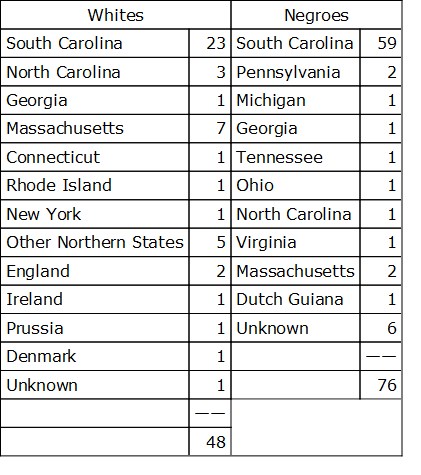
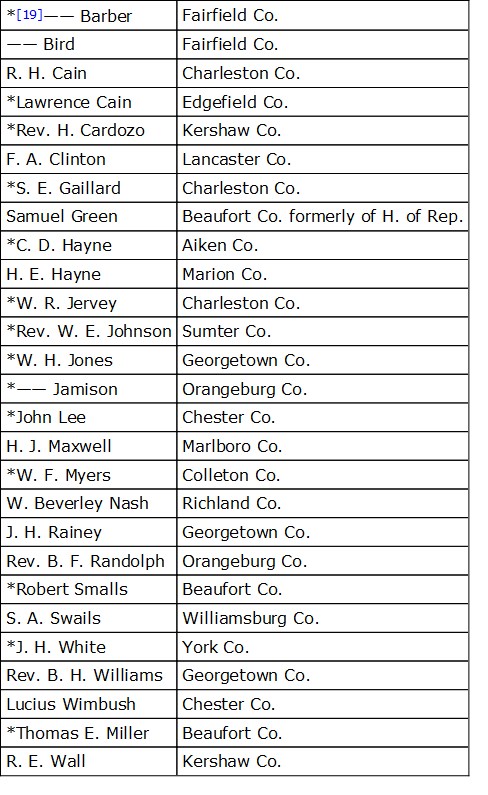
19 Names marked with asterisk not in lists given in Reynold's Reconstruction in South Carolina, pp. 106-107, 394-396.
Member of the House of Representatives of South Carolina During Reconstruction Period167

Additional names by Bishop George W. Clinton.
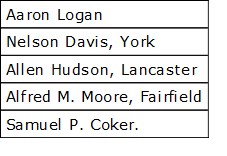
See Reynold's Reconstruction, p. 505.
Members of South Carolina General Assembly, 1868168Senators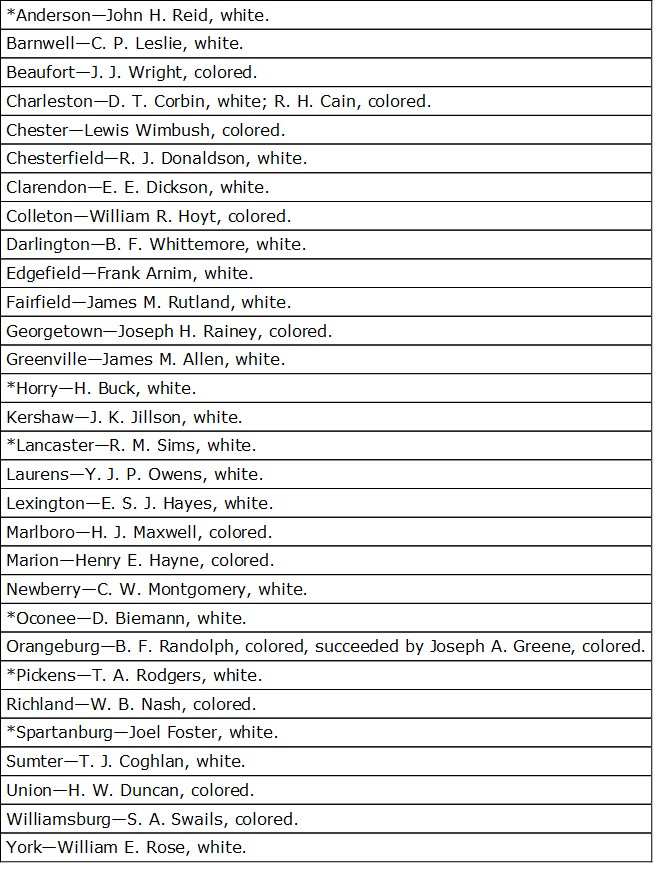
The number of white senators elected was twenty-one, and of colored, ten.
RepresentativesAbbeville—George Dusenberry, T. B. Milford, James Martin, white; R. M. Valentine, W. J. Lomax, colored.









